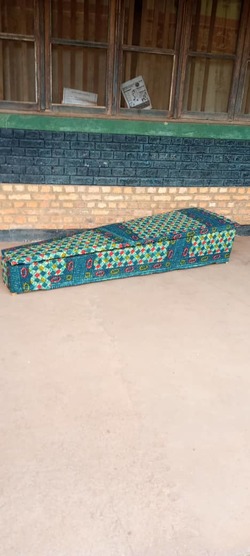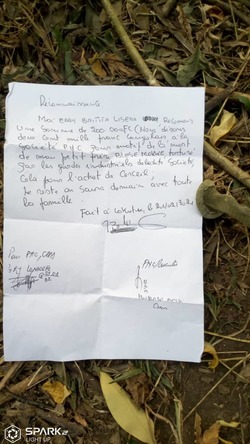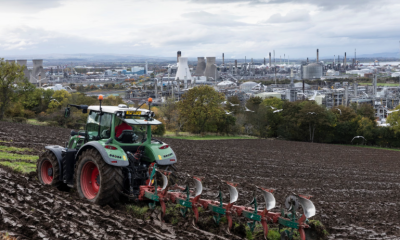NGO WORK
DR Congo oil palm company bankrolled by development banks unleashes wave of violence against villagers after peaceful protests
Published
5 years agoon
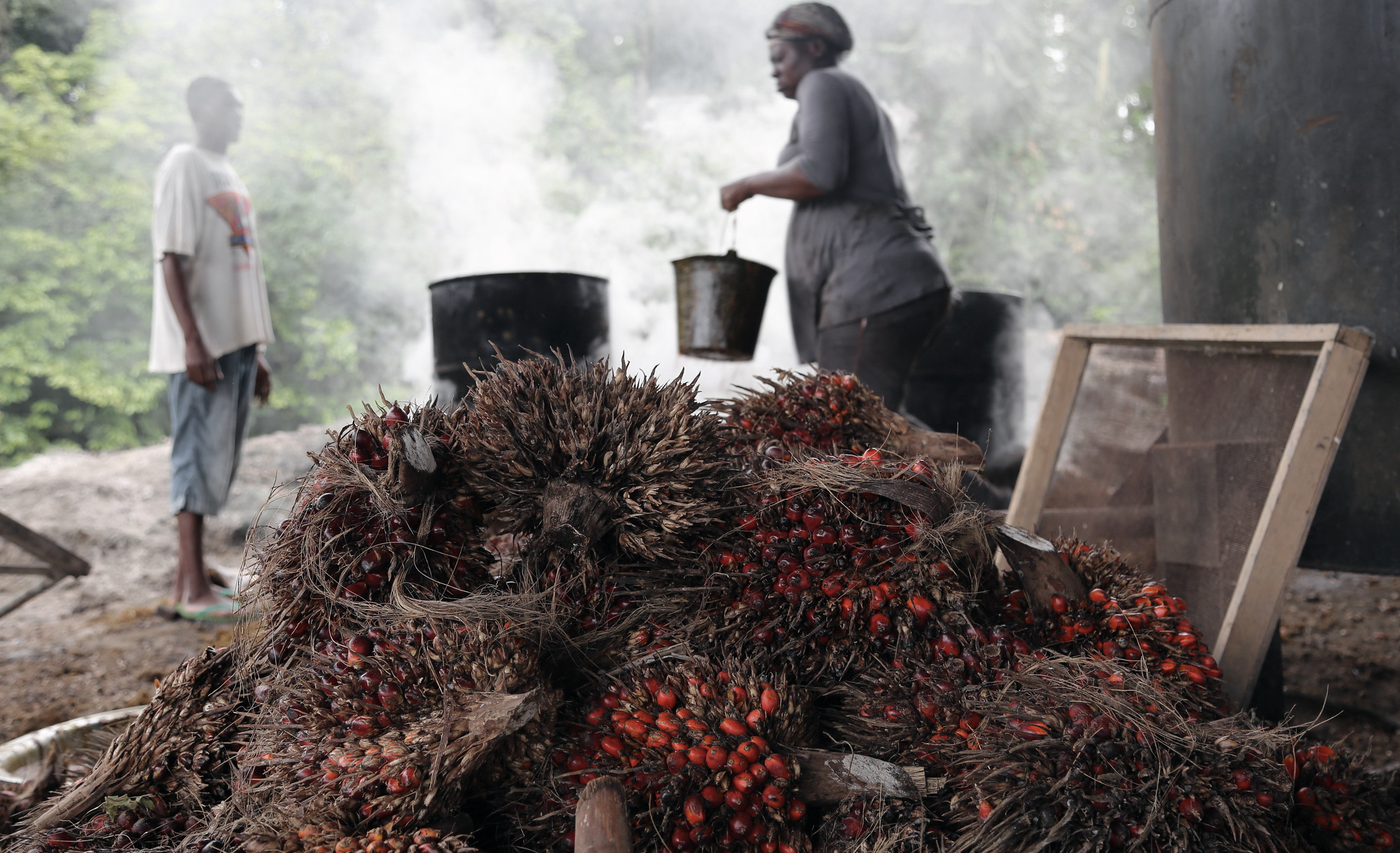
On 13 February 2021, local communities in the area of Lokutu, Tshopo Province, Dr Congo organised peaceful actions to protest the arrival of a delegation of investors organised by the oil palm plantation company Plantations et Huileries du Congo (PHC). The villagers were protesting against the failure of the company to provide them with any benefits after more than a 100 years of illegally occupying their lands and the recent takeover of the company by a private equity fund called Straight KKM without any involvement from the communities. Since 2013, PHC, until last year owned by the Canadian company Feronia Inc, has received over US$150 million in financing from the development banks of the UK, Belgium, France, Germany, the Netherlands, Spain and the US.
A peaceful protest was held at the airplane landing strip in Mwingi to greet the arrival of a delegation of the new owners of PHC/KKM. The new director of PHC and one of its new owners, the Congolese businessman Kalaa Mpinga, was not part of the delegation, which was composed of 3 Asian investors, a representative of PHC and a South African. The villagers then marched from the airfield to the office of PHC in Lokutu.
The next day, the delegation attempted to visit some of the affected communities (notably in Mindua). In some places they were confronted with roadblocks organized by the communities as a sign of discontent.
In the days that followed, PHC’s security guards (known as gardes industriels) began terrorising the local populations.
According to the information provided by numerous local sources, dozens of villagers from the communities of Mindua, Mwingi, Bolesa, and Mosite (all located in the vicinity of PHC’s Lokutu plantations) suffered arbitrary arrests and/or physical violence. At the present time, it appears that 12 people are still being held in Yangambi prison (150 km from Lokutu and therefore far from their villages and from any support to assist them in asserting their rights).
One of those attacked by the company’s security guards died shortly after being badly beaten, tortured and detained. Blaise Mokwe, a 33-year old man engaged to be married, from the village YAKOTE, community of BOLESA, BOLINGA sector, Yahuma territory in the middle of the PHC/ Feronia/ KKM Lokutu plantations in the Province of Tshopo in the Democratic Republic of Congo, died on 21 February 2021 as a result of torture, assault and beatings, perpetrated by the security guards of PHC / Feronia / KKM in Yahuma/Basoko territory, at the Lokutu plantation site, Tshopo Province (DRC).
Here is a breakdown of the arrests and assaults that have occurred so far:
1] Arbitrary arrests in Mwingi – 13 February 2021 – of 3 RIAO-RDC members and 1 community leader
2] Arbitrary arrests in Bolesa – 15 February 2021 – of 8 people, one person who died of his injuries
3] Arbitrary arrests in Mindua – 15 February 2021 (and following days) – of 5 (or more) persons
4] Information that several women were likely raped in Mindua, Mwingi, Bolesa, Mosite
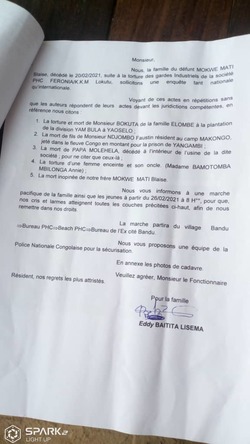
Increasing violence over the past months
According to community members, since the recent sale of PHC, and the hiring of Mr King Mpika as Security Estate Manager (head of security) of the PHC in Lokutu, the criminalisation of local protest has increased. According to Gilbert Lokombu Limela, President of the Civil Society of Basoko (Lokutu side), King Mpika’s security operations also include a detachment of around 50 police officers from Kisangani. Tensions have also been heightened because of the delay in a mediation process that was promised to the communities by the DEG-FMO-Proparco complaint mechanism over 2 years ago.
Mr King Mpika (who according to some sources is related to the new PHC owner Kalaa Mpinga) is said to have made death threats towards two of the detainees arrested on 13 February, before leaving Lokutu: Mr Christian Litikela and Chimita Alela.
He is said to have given the orders that led to the acts of repression and recent arrests.
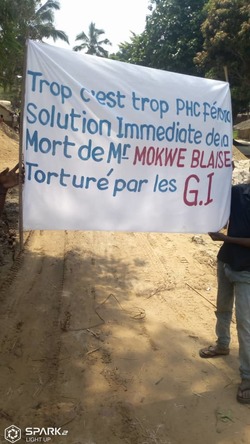
Circumstances of the arrests
According to local sources, the arrests at Mwingi were carried out by local police, at the request of PHC security. The security guards led or participated in the arrests.
In Mwinigi, three members of RIAO-DRC in Lokutu were arrested under a false pretext of inciting revolt, taking photos of the protest and providing interviews to journalists in which they explained the context of the Lokutu protests. Similar charges were made against the community leader who was arrested at the same time. Three of those arrested were badly beaten. One was released after a payment of 300,000 FC (US$150), while the three others were transferred to Yangambi prison
In the vicinity of Bolesa, the PHC security guards arrested 4 women and 4 men, which they then took to the police station in Lokutu. Several of those arrested were assaulted before they arrived at the police station. Some arrived handcuffed/tied. The eight villagers were taken to the holding cell in Lokutu and the four women were later released. Three of the men were transferred to Yangambi prison. One of those arrested and assaulted, Mr. Blaise Mokwe, was transfered to a hospital which could not care for him and he died on 21 February of his injuries at his home.
There are also reports that a young teacher from Mwingi, who is a local member of RIAO-RDC, was assaulted by PHC security guards while he was travelling to central Lokutu, without any reason given. According to local sources, the arrest was extremely violent. The teacher was eventually tortured, handcuffed and taken to Lokutu prison. He is reported to be in critical condition.
Following the violent incidents in the vicinity of Lokutu after the demonstration, further assaults and arrests were reportedly made in other villages, including Mindua. The majority of those arrested in Mindua were apprehended by PHC security guards on suspicion of stealing palm nuts and taken by the security guards to Lokutu police station. Sources indicate that five men were arrested, as well as one woman who is five months pregnant. The woman was allegedly beaten and raped and is now at risk of losing her baby. She is reported to have been transferred from the local police station in Lokutu to Yangambi prison.
Local sources also state that there were several cases of sexual assault and rape committed against women by PHC security guards in Mindua, Mwingi, Bolesa and Mosite during this wave of violence.
Killing of Blaise Mokwe
Blaise Mokwe, a 33-year old man engaged to be married, from the village of Yakote, was arrested on 15 February at his home near his village of Yakote. That day, he started his day by sweeping his yard in front of his house. As his broom was broken, he went to the plantation to look for a stick to repair his broom.
That’s when he was arrested by the security guards. They accused Mr. Mokwe of “stealing palm nuts belonging to the plantation” and forced Mr. Mokwe to take them to his house to search the premises and find the “nuts”. Following the search, they found no nuts or oil at Mr Mokwe’s home. However, the security guards decided to take Mr Mokwe to the Lokutu police station. Considering this arbitrary arrest and in the absence of any offence, Mr Mokwe refused to follow them. The security guards then tried to take him by force to the Lokutu police station.
When Mr. Mokwe resisted, the security guards beat and kicked him and then took him by force, handcuffed, to the Lokutu police station (25 km away).
On arrival at the police station, the commander reportedly demanded that Mr Mokwe be immediately taken to hospital as his health was in a critical state. Unfortunately, at the hospital, due to a lack of medication, Mr Mokwe was unable to receive the necessary care. He therefore returned to his village in Yakote. He died on February 21, in Yakote/Mosite, of the injuries sustained when beaten by the PHC security guards.
In an act of protest and desperation, Mr Mokwe’s family took his body to the Lokutu police station the next day to seek justice. But the Lokutu local police commander refused to allow the body to be taken to the police station because, according to him, the security guards of PHC were responsible for Mr Mokwe’s death, not the police. The body was then taken to the PHC workers’ camp in Lokutu, where it remained during the day of February 22nd, in the presence of some relatives.
PHC made a contribution of 200,000 FC (US$100) to the funeral expenses of Mr Mokwe. Subsequently, PHC requested that an acknowledgement of debt be signed by Mr Mokwe’s elder brother, committing him to reimburse PHC for the payment of the advance to cover funeral expenses. Subsequently, sources confirm that representatives of PHC acknowledged that Mr Mokwe’s death was linked to the assault and beatings he suffered at the hands of its security guards.
This is understood to be what motivated the company to promise the family an additional indemnity of 500,000 FC (US$300) to cover the funeral expenses.
Mr. Mokwe was buried on 22 February at the end of the day.
Related posts:
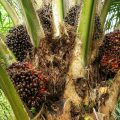
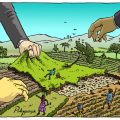 Development banks have no business financing agribusiness
Development banks have no business financing agribusiness
 Fresh arrests of land rights defenders, villagers in a newly announced second COVID-19 lockdown in Uganda…
Fresh arrests of land rights defenders, villagers in a newly announced second COVID-19 lockdown in Uganda…
 COVID-19 LOCKDOWN LAND GRAB VIOLENCE: Multinational company, security firm sued for torture
COVID-19 LOCKDOWN LAND GRAB VIOLENCE: Multinational company, security firm sued for torture
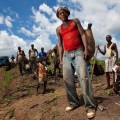 They should not be called public development banks
They should not be called public development banks
You may like
NGO WORK
Climate wash: The World Bank’s Fresh Offensive on Land Rights
Published
2 months agoon
November 13, 2025
Climate wash: The World Bank’s Fresh Offensive on Land Rights reveals how the Bank is appropriating climate commitments made at the Conference of the Parties (COP) to justify its multibillion-dollar initiative to “formalize” land tenure across the Global South. While the Bank claims that it is necessary “to access land for climate action,” Climatewash uncovers that its true aim is to open lands to agribusiness, mining of “transition minerals,” and false solutions like carbon credits – fueling dispossession and environmental destruction. Alongside plans to spend US$10 billion on land programs, the World Bank has also pledged to double its agribusiness investments to US$9 billion annually by 2030.
This report details how the Bank’s land programs and policy prescriptions to governments dismantle collective land tenure systems and promote individual titling and land markets as the norm, paving the way for private investment and corporate takeover. These reforms, often financed through loans taken by governments, force countries into debt while pushing a “structural transformation” that displaces smallholder farmers, undermines food sovereignty, and prioritizes industrial agriculture and extractive industries.
Drawing on a thorough analysis of World Bank programs from around the world, including case studies from Indonesia, Malawi, Madagascar, the Philippines, and Argentina, Climatewash documents how the Bank’s interventions are already displacing communities and entrenching land inequality. The report debunks the Bank’s climate action rhetoric. It details how the Bank’s efforts to consolidate land for industrial agriculture, mining, and carbon offsetting directly contradict the recommendations of the IPCC, which emphasizes the protection of lands from conversion and overexploitation and promotes practices such as agroecology as crucial climate solutions.
Read full report: Climatewash: The World Bank’s Fresh Offensive on Land Rights
Source: The Oakland Institute
Related posts:

 30 civil society organizations have written to the World Bank Group demanding to publicly disclose the Africa Energy Approach paper.
30 civil society organizations have written to the World Bank Group demanding to publicly disclose the Africa Energy Approach paper.
 World Bank’s new scheme to privatize land in the developing world exposed
World Bank’s new scheme to privatize land in the developing world exposed
 World Bank is backing dozens of new coal projects, despite climate pledges
World Bank is backing dozens of new coal projects, despite climate pledges
 Communities Under Siege: New Report Reveals World Bank Failures in Safeguard Compliance and Human Rights Oversight in Tanzania
Communities Under Siege: New Report Reveals World Bank Failures in Safeguard Compliance and Human Rights Oversight in Tanzania
NGO WORK
Africa’s Land Is Not Empty: New Report Debunks the Myth of “Unused Land” and Calls for a Just Future for the Continent’s Farmland
Published
2 months agoon
November 13, 2025
A new report challenges one of the most persistent and harmful myths shaping Africa’s development agenda — the idea that the continent holds vast expanses of “unused” or “underutilised” land waiting to be transformed into industrial farms or carbon markets.
Titled Land Availability and Land-Use Changes in Africa (2025), the study exposes how this colonial-era narrative continues to justify large-scale land acquisitions, displacements, and ecological destruction in the name of progress.
Drawing on extensive literature reviews, satellite data, and interviews with farmers in Zambia, Mozambique, South Africa, and Zimbabwe, the report systematically dismantles five false assumptions that underpin the “land abundance” narrative:
-
That Africa has vast quantities of unused arable land available for cultivation
-
That modern technology can solve Africa’s food crisis
-
That smallholder farmers are unproductive and incapable of feeding the continent
-
That markets and higher yields automatically improve food access and nutrition
-
That industrial agriculture will generate millions of decent jobs
Each of these claims, the report finds, is deeply flawed. Much of the land labelled as “vacant” is, in reality, used for grazing, shifting cultivation, foraging, or sacred and ecological purposes. These multifunctional landscapes sustain millions of people and are far from empty.
The study also shows that Africa’s food systems are already dominated by small-scale farmers, who produce up to 80% of the continent’s food on 80% of its farmland. Rather than being inefficient, their agroecological practices are more resilient, locally adapted, and socially rooted than the industrial models promoted by external donors and corporations.
Meanwhile, the promise that industrial agriculture will lift millions out of poverty has not materialised. Mechanisation and land consolidation have displaced labour, while dependency on imported seeds and fertilisers has trapped farmers in cycles of debt and dependency.
A Continent Under Pressure
Beyond these myths, the report reveals a growing land squeeze as multiple global agendas compete for Africa’s territory: the expansion of mining for critical minerals, large-scale carbon-offset schemes, deforestation for timber and commodities, rapid urbanisation, and population growth.
Between 2010 and 2020, Africa lost more than 3.9 million hectares of forest annually — the highest deforestation rate in the world. Grasslands, vital carbon sinks and grazing ecosystems, are disappearing at similar speed.
Powerful actors — from African governments and Gulf states to Chinese investors, multinational agribusinesses, and climate-finance institutions — are driving this race for land through opaque deals that sideline local communities and ignore customary tenure rights.
A Call for a New Vision
The report calls for a radical shift away from high-tech, market-driven, land-intensive models toward people-centred, ecologically grounded alternatives. Its key policy recommendations include:
-
Promoting agroecology as a pathway for food sovereignty, ecological regeneration, and rural livelihoods.
-
Reducing pressure on land by improving agroecological productivity, cutting food waste, and prioritising equitable distribution.
-
Rejecting carbon market schemes that commodify land and displace communities.
-
Legally recognising customary land rights, particularly for women and Indigenous peoples.
-
Upholding the principle of Free, Prior, and Informed Consent (FPIC) for all land-based investments.
This report makes it clear: Africa’s land is not “empty” — it is lived on, worked on, and cared for. The future of African land must not be dictated by global capital or outdated development theories, but shaped by the people who depend on it.
Download the Report
Read the full report Land Availability and Land-Use Changes in Africa (2025) to explore the evidence and policy recommendations in detail.
Related posts:

 Financial Institutions from Africa have made a monumental commitment of $100 billion to Africa’s green industrialization, a decision of immense significance that has the potential to shape Africa’s future.
Financial Institutions from Africa have made a monumental commitment of $100 billion to Africa’s green industrialization, a decision of immense significance that has the potential to shape Africa’s future.
 Africa adopts the Africa Climate Innovation Compact (ACIC) Declaration to drive the continent towards innovative climate solutions.
Africa adopts the Africa Climate Innovation Compact (ACIC) Declaration to drive the continent towards innovative climate solutions.
 One in three people sleeps on an empty stomach – World Bank Report.
One in three people sleeps on an empty stomach – World Bank Report.
 Transforming Africa’s livestock sector is key to food security-Report
Transforming Africa’s livestock sector is key to food security-Report
NGO WORK
Discover How Foreign Interests and Resource Extraction Continue to Drive Congo’s Crisis
Published
2 months agoon
November 12, 2025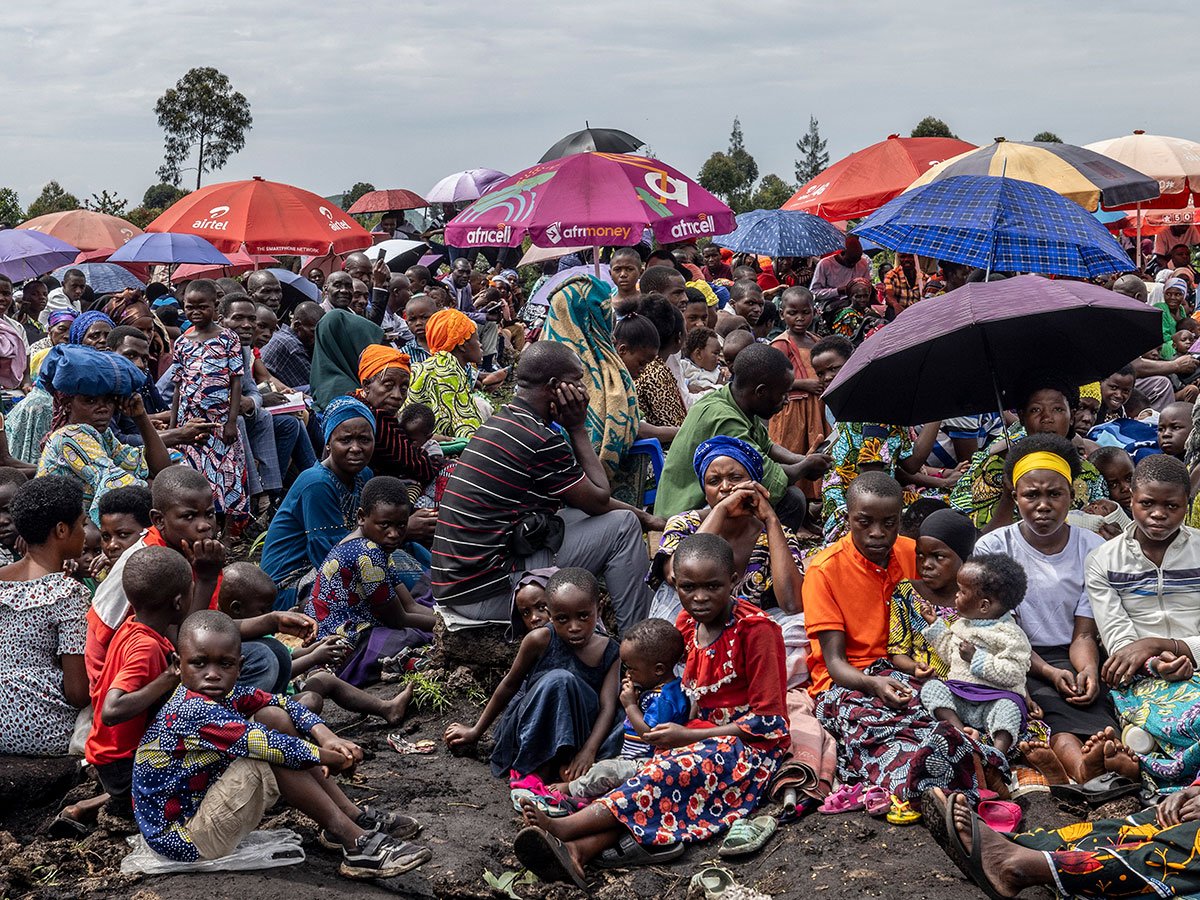
Whereas Donald Trump hailed the “peace” agreement between Rwanda and DRC as marking the end of a deadly three-decade war, a new report from the Oakland Institute, Shafted: The Scramble for Critical Minerals in the DRC, exposes it as the latest US maneuver to control Congolese critical minerals.
Under the Guise of Peace
After three decades of deadly wars and atrocities, the June 2025 “peace” deal between Rwanda and the Democratic Republic of the Congo (DRC) lays bare the United States’ role in entrenching the extraction of minerals under the guise of diplomacy. For decades, US backing of Rwanda and Uganda has fueled the violence, which has ripped millions of Congolese lives apart while enabling the looting of the country’s mineral wealth. Today, Washington presents itself as a broker of peace, yet its longstanding support for Rwanda made it possible for M23 to seize territory, capture key mining sites, and forced Kinshasa to the negotiation table with hands tied behind its back. By legitimizing Rwanda’s territorial advances, the US-brokered agreement effectively rewards aggression while sidelining accountability, justice for victims, and the sovereignty of the Congolese people.
The incorporation of “formalized” mineral supply chains from eastern DRC to Rwanda exposes the pact’s true aim: Securing access to and control over minerals under the guise of diplomacy and “regional integration.” Framed as peacemaking, this is part of United States’ broader geopolitical struggle with China for control over critical resources. Far from fostering peace – over a thousand civilians have been killed since the deal was signed while parallel negotiations with Rwanda’s rebel force have collapsed – this arrangement risks deepening Congo’s subjugation. Striking deals with the Trump administration and US firms, the DRC government is surrendering to a new era of exploitation while the raging war continues, driving the unbearable suffering of the Congolese people.
Introduction
The conflict in eastern DRC, which dates back three decades to the aftermath of the 1994 Rwandan genocide and subsequent Congo Wars, has claimed over six million lives, displaced millions more, and inflicted widespread suffering. Since late 2021, Rwanda and its proxy militia, M23, have stormed through mineral-rich lands and regional capitals, inflicting brutal violence and triggering mass displacement. While billions of dollars in natural resources are extracted from the area, Congolese communities toil in extreme poverty.
On June 27, 2025, a “peace” agreement was signed between Rwanda and the DRC under the auspices of the Trump administration, with diplomatic assistance from Qatar.1 The deal included pledges to respect the territorial integrity of both countries, to promote peaceful relations through the disarmament of armed groups, the return of refugees, and the creation of a joint security mechanism. A key clause commits the countries to launch a regional economic integration framework that would entail “mutually beneficial partnerships and investment opportunities,” specifically for the extraction of the DRC’s mineral wealth by US private interests.
Placing the deal in a historical perspective – after three decades of conflict and over seven decades of US chess game around Congolese minerals – this report examines its implications for the Congolese people as well as the interests involved in the plunder of the country’s resources.
The report begins by retracing 30 years of war, fueled by the looting of Congo’s mineral wealth and devastating for the people of eastern DRC. It then examines how US policy in Central Africa, from the Cold War to the present, has been shaped by its interest in Congolese minerals, sustained alliances with Rwanda and Uganda, and a consistent pattern of overlooking atrocities in support of these allies.
The report then analyses the implications of the regional economic integration aspect of the deal, which aims to link mineral supply chains in the DRC and Rwanda with US investors. The last sections examine the prospect for lasting peace and security resulting from the deal and the impact of growing involvement of US private actors in DRC and Rwanda.
Original Source: Oakland Institute
Related posts:

 Profit off Peace? Meet the Corporations Poised to Benefit from the DRC Peace Deal
Profit off Peace? Meet the Corporations Poised to Benefit from the DRC Peace Deal
 DR Congo: RIAO-RDC calls for the immediate release of four leaders from the community of Mwingi who were arrested after a peaceful protest against the oil palm plantation company PHC
DR Congo: RIAO-RDC calls for the immediate release of four leaders from the community of Mwingi who were arrested after a peaceful protest against the oil palm plantation company PHC
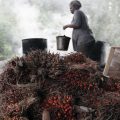 DR Congo oil palm company bankrolled by development banks unleashes wave of violence against villagers after peaceful protests
DR Congo oil palm company bankrolled by development banks unleashes wave of violence against villagers after peaceful protests
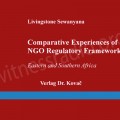 Operations of civil society organizations will continue to be stifled until government understands their work – New Book.
Operations of civil society organizations will continue to be stifled until government understands their work – New Book.

COP30 : a further step towards a Just Transition in Africa

‘Food and fossil fuel production causing $5bn of environmental damage an hour’

Four hundred fifty victim families of the Oil Palm project in Buvuma are to receive compensation by this Friday – Witness Radio

Britain, Netherlands withdraw $2.2 billion backing for Total-led Mozambique LNG

Four hundred fifty victim families of the Oil Palm project in Buvuma are to receive compensation by this Friday – Witness Radio

Women’s groups demand equality in land tenure security to boost food production.

Tension as Project-Affected Persons demand to meet Uganda’s President over Oil Palm growing on their grabbed land.

Land commission starts updating govt land countrywide.

Innovative Finance from Canada projects positive impact on local communities.
Over 5000 Indigenous Communities evicted in Kiryandongo District
Petition To Land Inquiry Commission Over Human Rights In Kiryandongo District
Invisible victims of Uganda Land Grabs
Resource Center
- REPARATORY AND CLIMATE JUSTICE MUST BE AT THE CORE OF COP30, SAY GLOBAL LEADERS AND MOVEMENTS
- LAND GRABS AT GUNPOINT REPORT IN KIRYANDONGO DISTRICT
- THOSE OIL LIARS! THEY DESTROYED MY BUSINESS!
- RESEARCH BRIEF -TOURISM POTENTIAL OF GREATER MASAKA -MARCH 2025
- The Mouila Declaration of the Informal Alliance against the Expansion of Industrial Monocultures
- FORCED LAND EVICTIONS IN UGANDA TRENDS RIGHTS OF DEFENDERS IMPACT AND CALL FOR ACTION
- 12 KEY DEMANDS FROM CSOS TO WORLD LEADERS AT THE OPENING OF COP16 IN SAUDI ARABIA
- PRESENDIANTIAL DIRECTIVE BANNING ALL LAND EVICTIONS IN UGANDA

